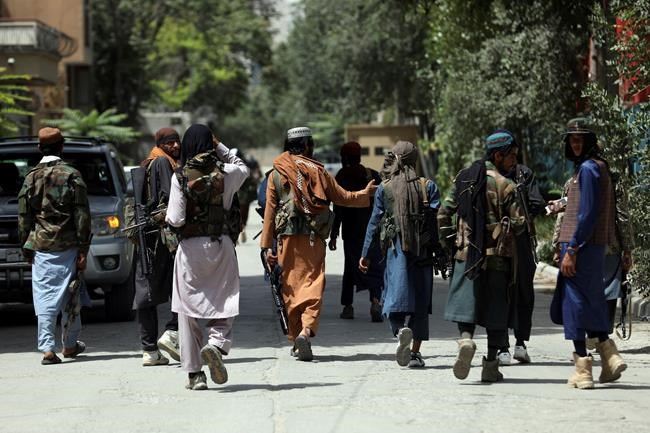‘Waiting to see what their actual true colors are:’ Worries for women in Afghanistan
Advertisement
Read this article for free:
or
Already have an account? Log in here »
To continue reading, please subscribe:
Monthly Digital Subscription
$0 for the first 4 weeks*
- Enjoy unlimited reading on winnipegfreepress.com
- Read the E-Edition, our digital replica newspaper
- Access News Break, our award-winning app
- Play interactive puzzles
*No charge for 4 weeks then price increases to the regular rate of $19.00 plus GST every four weeks. Offer available to new and qualified returning subscribers only. Cancel any time.
Monthly Digital Subscription
$4.75/week*
- Enjoy unlimited reading on winnipegfreepress.com
- Read the E-Edition, our digital replica newspaper
- Access News Break, our award-winning app
- Play interactive puzzles
*Billed as $19 plus GST every four weeks. Cancel any time.
To continue reading, please subscribe:
Add Free Press access to your Brandon Sun subscription for only an additional
$1 for the first 4 weeks*
*Your next subscription payment will increase by $1.00 and you will be charged $16.99 plus GST for four weeks. After four weeks, your payment will increase to $23.99 plus GST every four weeks.
Read unlimited articles for free today:
or
Already have an account? Log in here »
Hey there, time traveller!
This article was published 19/08/2021 (1576 days ago), so information in it may no longer be current.
Canadians observing the Taliban’s swift takeover of Afghanistan say they’re skeptical of the group’s claims that women’s rights will be respected under Islamic law.
Recalling the period of Taliban rule in the 1990’s, they worry the regime change will bring back a world in which girls can’t attend school, women aren’t allowed to work, and many are subject to rape and forced marriages.
“We’re very worried about the possibility of gross human rights violations, many of which will be borne by women and girls,” said Sarah Keeler, a spokeswoman for the not-for-profit Canadian Women for Women in Afghanistan.

Keeler said her organization’s Canadian staff are in contact with women they’ve worked with in Afghanistan, as well as those who’ve benefited from their efforts in the country — the group raises funds to support teachers and for education supplies, among other things.
The organization has received reports of Taliban members going to homes in Kabul to collect information on residents while extrajudicial killings have been reported in smaller provinces, she said.
While some prominent Afghan women have spoken out about their fears of being targeted, Keeler said any female in the country could be at risk.
“We’re talking about any mother who sends her daughter to university, women who spoke out against the Taliban in any kind of public forum … those who worked for any kind of civil society organizations or the public sector,” she said. “It’s a wide swath of society that is now at risk.”
Shahrzad Mojab, a University of Toronto professor who specializes in threats to women’s rights and education, said progress for feminism in Afghanistan has remained limited.
“There was a lot of funding provided by mostly white liberal feminists for four different women’s NGOs over the last 20 years,” she said. “Afghan women have managed to take advantage of these funding programs, but the best analysis of what is happening is that young Afghan women are outraged by both the corrupt western-backed government of Afghanistan, as well as fearful of a future under Taliban.”
Mojab said she isn’t convinced by the Taliban’s latest promises of reform for women, arguing there’s no room for women’s rights under Sharia law.
“Nothing should be framed within the rule of Sharia in the country. And no matter the so-called amnesty the Taliban is promising, this is not going to happen,” she said. “Sharia law, by itself, is authoritarian, dictatorial and exclusionary. And it is a game against the rights and well-being of women.”
Saddia Rahmanyar, a 23-year-old Toronto resident whose parents fled Afghanistan in the late 1990s, said her extended family in the country have heard the Taliban’s claims on a more moderate stance towards women but are skeptical.
With much of the country in chaos, however, Rahmanyar said her relatives have no choice but to hope the Taliban’s apparently altered stance is borne out by actions.
“For the moment they’re promising people that yes, girls can still go to school and yes, girls can still work,” she said. “But people are just waiting to see what their actual true colors are.”
This report by The Canadian Press was first published Aug. 19, 2021.



